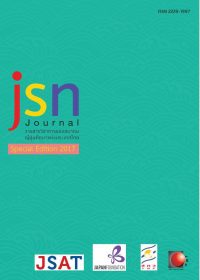An Analysis of the Teamwork between Doctors and Medical Interpreters: Derived from Simulated Consultations Mediated by Japanese-Thai Interpreters
Main Article Content
Abstract
This study reports on the results of the analysis of the teamwork between doctors and Japanese-Thai interpreters which were derived from six simulated consultations. Residents of a university hospital participated as doctors, senior Japanese volunteers played the role of patients, and Japanese major students taking the course “Interpretation” were the interpreters. All simulations were video-recorded and later transcribed using the transcription method of Discourse Analysis. Analysis was carried out from a sociocultural linguistics perspective and the results were summarized in a descriptive way.
The results revealed that doctors and interpreters faced challenges in three main areas: (a) communication, (b) language, and (c) interpersonal relationships. Based on the results, a practical guideline for doctors and Japanese-Thai interpreters is presented as a reference for triadic interactions.
Article Details
ข้อความและข้อคิดเห็นต่างๆ ในบทความเป็นของผู้เขียนบทความนั้นๆ ไม่ใช่ความเห็นของกองบรรณาธิการหรือของวารสาร jsn Journal
References
Angelelli, C. V. [HWU Lectures] (2014, April 4). Medical Interpreting and Cross-cultural Communication-Inaugural Lecture, Heriot-Watt University Inaugural Lecture Series.[Video file] Retrieved from https://www.youtube.com/watch?v=sAjY7q-XFlM
Consulate-General of Japan in Chiang Mai. (2016, December 10). SCC 4th Symposium 「チェンマイで就活を終える」.
Flores, G., Laws, M. B., Mayo, S. J., Zuckerman, B., Abreu, M., Medina, L. & Hardt, E. J. (2003). Errors in Medical Interpretation and Their Potential Clinical Consequences in Pediatric Encounters. Pediatrics, 111 (1), 6-14.
Ministry of Labor, Heath, and Welfare of Japan (2016).「医療通訳に関する資料 一覧」Retrieved from http://www.mhlw.go.jp/stf/seisakunitsuite/bunya/0000056944.html
Nishikito, E. (2015). Medical Interpreting Services in the United States, Japan, and Thailand: Comparisons of the Teamwork between Physicians and Medical Interpreters. Jsn Journal, 5 (2), 70-88.
Putsch, R. W. (1985). Cross-cultural Communication: The Special Case of Interpreters inHealth Care. JAMA Journal of the American Medical Association, 254 (23), 3344-3348.
Sanguanphon, S. (2013). Medicalinterpreters(Japanese-Thai) at a private hospital in Thailand and a guideline for trainingprograms. (Master of Liberal Arts) Graduate school of Japanese Studies, Faculty of Liberal Arts, Thammasat University.
Thongtep, W. (2011, June 20). Ageing Japanese Seen as Strong Prospect for Long Stays. The Nation. Retrieved from https://www.pressreader.com/thailand/the-nation/20110620/283485022764265
Watanabe, Y. (2012). Japanese Interpreters in Bangkok’s International Hospitals: Implications for Intercultural Communication between Japanese Patients and Thai Medical Providers. Japan Journal of Multilingualism and Multiculturalism, 18 (1), 19-38.


